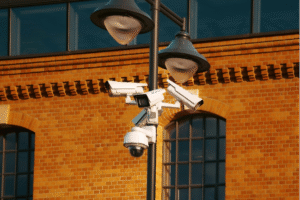Operating a security business in Texas without proper licensing isn’t just risky, it’s illegal. Class A misdemeanor charges, fines up to $4,000, and potential jail time await those who provide electronic security services without a valid Texas Security Contractor License. Whether you’re installing alarm systems, video surveillance, or access control devices, this 2-step overview will guide you through the essential licensing process.
Why Your Security Business Needs This License
Any company providing electronic security services in Texas must hold a Class B Security Contractor License. This includes businesses offering:
- Alarm system installation and monitoring
- Video surveillance systems
- Electronic access control devices
- Intrusion detection systems
- Security system maintenance and service
The stakes are high: Operating without a license exposes business owners and managers to the same criminal charges as unlicensed staff, plus potential civil lawsuits that can devastate your finances and reputation.
Step 1: Determine Your License Requirements
Before applying, identify exactly what your business needs. Most security contractors require a Class B Security Contractor Company License, which covers the broad spectrum of electronic security services.
Requirements:
- Must be at least 18 years old
- Pass a criminal background check
- Legal authorization to work in the United States
- Valid State ID or Driver’s License and Social Security Number
- Company Business Structure: LLC, LLP, Corporation, etc.
- Company Liability Insurance
Step 2: Contact License for Security to Apply
Becoming a licensed security contractor in Texas is simpler than you might think. License for Security can streamline the process so you can focus on running your business while we handle the compliance.
Primary Company Representative (PCR): Your business may designate your consultant at License for Security as the Primary Company Representative (PCR). The consultant has successfully passed all required state examinations and meets the statutory experience requirements as prescribed by the Texas Department of Public Safety – Private Security Bureau.
Processing Note: Background checks can extend processing times, especially if additional documentation is required.
Avoid These Common Mistakes
Research shows several recurring issues that delay or derail applications:
- Inconsistent personal information across documents
- Incomplete applications, missing required fields or attachments
- Wrong license type selection for your business services
- Expired or inadequate insurance coverage
- Failure to respond promptly to requests for additional information
What Happens After Approval?
Once approved, you’ll receive your official license documentation. All security technicians must obtain individual installer licenses registered under your company license before performing any work. These technicians need specific licenses for different services:
- Alarm Systems Installer License for intrusion alarms and monitoring
- Electronic Access Control Device Installer License for access systems
The Business Impact of Proper Licensing
Licensed security contractors enjoy significant advantages over unlicensed competitors:
- Eligibility for government contracts requiring licensed providers
- Enhanced client trust and credibility in a competitive market
- Legal protection in case of incidents or disputes
- Marketing advantages with the official license number display
- Access to restricted projects requiring permits and inspections
Ready to Get Started?
The Texas security market is growing rapidly, driven by increasing demand for electronic security solutions and technological integration. However, stricter compliance requirements and enhanced enforcement mean proper licensing is more critical than ever.
Don’t let the 6-week processing timeline delay your business launch or expansion. The security industry waits for no one, and unlicensed operation puts your entire business at risk.
Need expert guidance through the licensing process? License for Security provides qualified Primary Company Representatives and comprehensive support to navigate Texas security contractor licensing requirements efficiently. Our experienced team helps you avoid common pitfalls and ensures your application is processed smoothly.
Contact License for Security today to discuss your specific licensing needs and get your security business properly licensed in Texas. Time is money in the security industry—make sure you’re legally protected while you grow your business.





